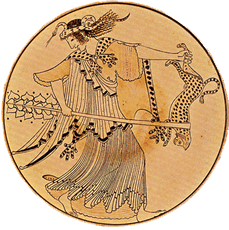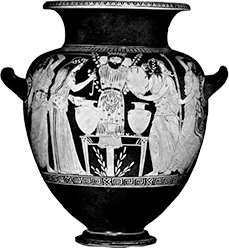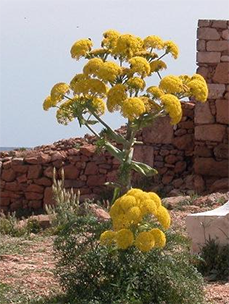Quiz quotations ("quiz-quotes") are brief passages — a few lines — in Greek and from ancient Greek authors, in other words, real Greek. They typically will be assigned for the same day as longer readings ("beta-readings"), therefore, one to go along with each chapter in the book. For homework, I am asking that you:
- Read the assigned quiz-quote and associated discussion (see below) — as with other assignments, be ready to read the quote out loud in class
- Write a translation of it — use translation notes supplied below
- Write down a brief comment: your course-relevant, quote-relevant thoughts about the passage in question
If you do optional outside research. . .
- Please do NOT
- Use unvetted, unscholarly sources like Google or Wikipedia
- Make unwarranted assumptions based on TV, movies, childhood reading, pure invention
- Use instead either
- The Oxford Classical Dictionary (PODS logon required),
- Brill's New Pauly via Brill Online (ditto), or
- Sources linked to below
Ch8 Quiz-Quote
Ἄνδρα μοι ἔννεπε, Μοῦσα, πολύτροπον, ὃς μάλα πολλὰ | πλάγχθη, ἐπεὶ Τροίης ἱερὸν πτολίεθρον ἔπερσε.
Homer Odyssey book 1 lines 1-2. Try translating using vocabulary below:
ἔννεπε. (verb — note form!), from ἐννέπω, "tell of/about, " "sing of/about" + direct object in accusative.
πολύτροπον. πολύτροπος (masc. & fem.), πολύτροπον (neut.). 2nd decl. adjective, "of many ways, "clever, resourceful" (case? modifies?) .
ὅς = "who." (masc. nominative sing. relative pronoun)
μάλα πολλά. literally "a great many (things)"; here = adverb "very muchl" (with πλάγχθη).
πλάγχθη. "wandered" (3rd sing. simple past-tense passive voice of πλάζω, "I beat upon," "I force to wander about").
Τροίης, Ionic genitive, from Τροία, Τροίας, ἡ.
ἱερόν. ἱερός, ἱερά, ἱερόν. "Holy" (modifies?).
πτολίεθρον, τό. "City," "citadel." (Related to π(τ)όλις, "city.")
ἔπερσε. "sacked, destroyed" (3rd sing. simple past of πέρθω)
Ch9 Quiz-Quote
εἶναι δὲ γλυκὺν ὧδε φίλοις, ἐχθροῖσι δὲ πικρόν
Solon fragment 13 line 5. This quote comes from the poetry of Solon (fr. 13.5), Athenian statesman and archon in 594/3 BCE. Having just prayed to the Muses for fame and fortune won honestly, Solon says, ... what??
For Solon, see the CIV reading for chapter 8.
In praying this way, he is echoing what turns out to be the chief moral dictum of ancient Greek popular morality.
Grammar:
εἶναι. infinitive "to be." Solon is praying "to be" something.
γλυκύν. "sweet," "pleasant" (cf. "glycerine"). Accusative adjective — acc. because it agrees with the understood accusative subject of the infinitive, μέ ("me"). (Infinitives often — not always — have their subjects in the accusative).
ὧδε. "thus" (similar to οὗτως) — here translate "just so," "likewise," "and with that."
ἐχθροῖσι. poetic masculine dative plural of ἐχθρός, "enemy."
πικρόν. "bitter," accusative adjective — accusative for same reason asγλυκύν.
Ch 10 Quiz Quote

. . . ἀμφὶ δὲ νάρθηκας ὑβριστὰς
ὁσιοῦσθ’· αὐτίκα γᾶ πᾶσα χορεύσει,
Βρόμιος ὅστις ἄγηι θιάσους,
εἰς ὄρος εἰς ὄρος.
Euripides Bacchae 113-116 (translation notes below)
What do you think this bit of choral song is all about?
Euripides' tragic play the Bacchae (first produced 405 BCE) tells a story of hubris: the "wanton outrage" or "violence" of Pentheus, king of Thebes, who seeks to stamp out the worship of Dionysus in his kingdom. He views Dionysus as running a cult freeing women to commit hubris, "outrage" detrimental to patriarchal power. In the end, Dionysus induces the king to dress up as a bacchant, a female worshiper of Dionysus, to spy on his mother and her sisters as they worship the god. They mistake the king for an animal and, in their frenzy, tear him limb from limb.
This passage is from the parodos, the song that the chorus sings and dances (khoros, "dance") as they make their entrance on stage. The chorus members in this case are playing bacchants from Asia Minor, what is now Turkey. Bacchants, in Greek, bakkhai, were women who worshiped the god Bakkhos, better known Dionysus; their male counterparts were called bakkhoi. They got their name from the chant that they recited: iō bakkhe/bakkhē, "Hey, Bacchus/Baccha!"
(The mythological version of bakkhai could also be called maenads, "women in the throes of madness." See the image above.)

Dionysus was the god of wine, revelry, release from inhibition, and . . . dramatic performance. He was the god of erasure of difference, of merging of personalities, of becoming other than yourself. He was celebrated with drinking, with parades, with costumes and masks. In myth, he is also worshiped with snake handling, the ripping apart of animals (sparagmos), and the eating of raw flesh (ōmophagia).
Masking and impersonation were key elements of Dionysian worship, so much so that the transformative power of the mask could itself be worshiped as the embodiment of the god, as in the dinos painter's maenad stamnos. Boys being initiated into the mysteries of Dionysus would dress as women to experience the gender fluidity of the god.
Translation Notes
ἀμφί + acc. "Around."
νάρθηξ, νάρθηκος, ὁ. Giant fennel, ferula communis. The stalk of the giant fennel (in translation, call it "fennel") served as the shaft of the ivy-topped thyrsus, the "wand" that Dionysus and his followers carried with them (see image above).

ὑβρίστης, ὑβρίστου, ὁ. The noun refers to anyone or anything (in the masculine gender) who/that commits hubris, "outrage." Here, the noun is being used as an adjective — what translation makes sense to you? Why?
ὁσιοῦσθ’, elided form of ὁσιοῦσθε, present middle from the omicron contract verb ὁσιόω, "make holy," in middle, "keep oneself pure."
αὐτίκα. "Straight away," "immediately."
γᾶ. Doric form of γῆ, "earth."
χορεύω, χορεύσω, ἐχόρευσα. "Dance." χορεύσω, the second principal part, indicates the future system with its sigmatic future stem, χορεύ-σ-. The endings are regular present endings, but the time-frame is future.
Βρόμιος. Bromios was one of the epithets, the by-names, of the god Dionysus. It's usually taken to mean "roarer." It refers to the god in his avatar of a bull.
ὅστις. ὅς "who" + τις "someone" = "whoever." What case/number/gender?
ἄγηι = 3rd-person active present subjunctive mood of ἄγω. The use of the subjunctive makes it more hypothetical, but it's not a distinction we can easily translate here: "whoever leads." ("Whoever" should/would lead" would be more suitable for an optative.)
θιάσους. From θιάσος, θιάσου, ὁ. "Bacchic revel, rout," "sacred band."
Quiz-Quotes, Athenaze Chs 11-12
From Herodotus History of the Persian Wars 2.1. . .
Below find links to PDF text with detailed commentary in footnotes. PLEASE MAKE GOOD USE OF NOTES! It may also help to use the Perseus Word Study (= form lookup) Tool and the Lexicon.
For CH11 quiz, LINES 1-3 of Greek on PDF document:
Φιλέλλην δὲ γενόμενος ὁ Ἄμασις ἄλλα τε ἐς Ἑλλήνων μετεξετέρους ἀπεδέξατο καὶ δὴ καὶ τοῖσι ἀπικνεομένοισι ἐς Αἴγυπτον ἔδωκε Ναύκρατιν πόλιν ἐνοικῆσαι.
For CH12 quiz, LINES 4-6 of Greek on PDF document:
τοῖσι δὲ μὴ βουλομένοισι αὐτῶν ἐνοικέειν, αὐτόσε δὲ ναυτιλλομένοισι ἔδωκε χώρους ἐνιδρύσασθαι βωμοὺς καὶ τεμένεα θεοῖσι.
Check out this YouTube animation, The Hong Kong of the ancient world … a 3D animation of Naukratis:
Ch 13 Quiz Quote
Herodotus 8.68a1
φείδεο τῶν νεῶν μηδὲ ναυμαχίην ποιεῦ· οἱ γὰρ ἄνδρες τῶν σῶν ἀνδρῶν κρέσσονες τοσοῦτό εἰσι κατὰ θάλασσαν ὅσον ἄνδρες γυναικῶν.
RE-WRITTEN IN STANDARD ATTIC (only for comparison's sake)φείδου τῶν νεῶν μηδὲ ναυμαχίαν ποιοῦ· οἱ γὰρ ἄνδρες τῶν σῶν ἀνδρῶν κρείττονες τοσοῦτό εἰσι κατὰ θάλατταν ὅσον ἄνδρες γυναικῶν. |
COMMENTARY
- pheideo: Ionic imperative of pheidô (= Attic pheidou, middle), "spare!" pheidô takes nouns in the genitive
- tôn neôn: gen. plural of naus, "ship"
- mêde: "nor"
- naumakhiên: Ionic 1st. declension acc. sing. = Attic naumakhian. Object of poieo (next line)
- poieu: Ionic imperative for Attic poiou (middle voice), from poieô
- oi gar andres: i.e., the Greeks
- sôn: "your" (gen. plural of possessive adjective)
- tôn sôn andrôn: gen. of comparison (Athenaze I p. 237 near top)
- kressones: "stronger"
- tosouto: "so much" (with kressones)
- kata thalassan: "at sea"
- hoson: "as much as"
- andres gunaikôn: understand that as andres gunaikôn kreissones eisin
Note that Artemisia is dictating a message for Xerxes, king of the Persians, on whether to do battle with the Greek ships. What does she advise? How is she trying to make her point? What do you think of that? Click here to find out her notable feat at the battle. Find out more about Artemisia by clicking here.
Ch14 Quiz-Quote
Thucydides Histories 2.63.2
ὡς τυραννίδα γὰρ ἤδη ἔχετε αὐτήν, ἣν λαβεῖν μὲν ἄδικον δοκεῖ εἶναι, ἀφεῖναι δὲ ἐπικίνδυνον.
COMMENTARY
- ὡς — what sense of ὡς makes sense here? (Not in sense of "when")
- τυραννίδα. Fem. acc. sing. "tyranny." It is in apposition to — in effect, modifies — αὐτήν
- λαβεῖν. From λαμβάνω — what form??
- αὐτήν. This is just the simple pronoun ("him, her, it, etc.")
- Direct object of ἔχετε
- Takes place of the understood noun τὴν ἀρχήν ("the empire")
- ἣν λαβεῖν — relative pronoun + infinitive. Acts like the subject of the verb δοκεῖ
- ἄδικον. "Unjust," neut. sing. predicate adjective
- Predicate complement of εἶναι in δοκεῖ εἶναι
- Modifies the infinitive + direct object unite consisting of ἣν λαβεῖν, subject of δοκεῖ
- ἀφεῖναι δὲ ἐπικίνδυνον
- Read ἣν ἀφεῖναι δὲ ἐπικίνδυνον δοκεῖ εἶναι
- ἀφεῖναι is aorist active infinitive of ἀφίημι, "to let go," "to give up"
- ἐπικίνδυνον. "dangerous."
This is from the last speech the Athenian statesman Pericles delivers in Thucydides account of the Peloponnesian War (431-404 BCE, between Athens and Sparta; see "Pericles" via Brills online). autên ("it") refers to the Athenian empire (arkhê) threatened by this war. Pericles is addressing the Athenian assembly. What point is he trying to make?
Ch15 Quiz-Quote
ἀλλ᾽— Ἡρακλῆος γὰρ ἀνικήτου γένος ἐστέ —
θαρσεῖτ᾽· οὔπω Ζεὺς αὐχένα λοξὸν ἔχει
(Tyrtaeus)
οὐ παντὸς ἀνδρὸς ἐς Κόρινθόν ἐσθ᾽ ὁ πλοῦς. (Aristophanes)
COMMENTARY
Tyrtaeus
- The two lines are best understood as a simple, short sentence (ἀλλὰ θαρσεῖτε) interrupted in the middle by a parenthetical statement (Ἡρακλῆος γὰρ ἀνικήτου γένος ἐστέ). Translate therefore using the following word order: ἀλλὰ θαρσεῖτε. Ἡρακλῆος γὰρ ἀνικήτου γένος ἐστέ
- ἀνικήτου. adj. "invincible," but what case? (and modifying what?)
- θαρσεῖτ. = θαρσεῖτε, from verb θαρσέω, "I am bold"
- οὔπω. "not yet"
- αὐχένα λοξὸν. "(his) neck bent away" (acc.). (If your neck is bent away you have given up on someone/something)
Whom do you think the poet is addressing? Though I've given you but a mere two lines of a longer poem, how might you contextualize? (How might you relate this quote to the ch18 civ. reading?)
Aristophanes
- παντὸς ἀνδρὸς. genitive of characteristic, "X is characteristic of . . .," "X is for . . ."
- ἐς. = preposition εἰς
- ἐσθ᾽. = ἐστι
- πλοῦς. "voyage"
Again, what do you think the author (the fifth-cent. BCE comedy-writer Aristophanes — or is it the third-cent. BCE grammarian and librarian, Aristophanes of Byzantium?) is getting at? This fragment comes from an unknown comedy (or something); all that were are given is this scrap as a quotation in the lexicographer, Hesychius. Let me translate H's entry for this passage:
"ou pantos andros es Korinthon esth' ho plous: Aristophanes (wrote this), for to foreigners sailing into Corinth, it seems to be one difficult city on account of the magical charms of the city's prostitutes. For the Corinthians really used to go in for that kind of thing in a big way, whence the luxury of their lifestyle."
Ch16 Quiz-Quote
νῦν δ᾽ ἐνθάδ᾽ ἐλθὼν, ὥσπερ ἐς Ἀσκληπιοῦ
ἐγκατακλιθεὶς σωθείς τε, τὸν λοιπὸν χρόνον
ἀναβεβίωκα. . . .
Menander, Papyrus Didotiana b 9-11
COMMENTARY
- ἐνθάδ᾽. = ἐνθάδε, "to this place"
- ὥσπερ. just as if
- ἐς Ἀσκληπιοῦ. Understand εἰς Ἀσκληπιοῦ ἱερόν, "into a temple of (the healing god) Asclepius"
- ἐγκατακλιθεὶς. "having lain down therein," aorist passive participle of ἐγκατακλίνω
- σωθείς. "having been saved," aorist passive participle of σῴζω, "save"
- τὸν λοιπὸν χρόνον. Accusative of extent of time: "for the remaining time," "for the rest of my life"
- ἀναβεβίωκα. "I have come back to life," perfect active indicative of ἀναβιόω
This comes from a fragment (preserved on papyrus) of a lost comedy of Menander (342?-291? BCE). The is the "Prologue," or the introductory speaker addressing the audience directly. What do you think he is saying? Hint: here is what he says before our quote:
"Gentlemen, at no point during my entire life was I anything but dead, believe you me. The beautiful, the good, the holy, the foul — it was all one and the same. It was as if my thoughts had been enveloped by some sort of darkness, which concealed and hid from me all these things. . . ."
For the quiz, translate and interpret the passage.
Chapter 17 Quiz-Quote
τεθνάμεναι γὰρ καλὸν ἐνὶ προμάχοισι πεσόντα
ἄνδρ᾽ ἀγαθὸν περὶ ἧι πατρίδι μαρνάμενον· (Tyrtaeus fr. 10 lines 1-2)
- τεθνάμεναι. Translate "to be dead." Perfect act. inf. related to Attic Greek verb ἀποθνήσκω, "to die." The subject of this infinitive will be in the accusative
- ἐνὶ = ἐν
- προμάχοισι = προμάχοις, from ὁ πρόμαχος, -ου, "one fighthing in the forefront"
- πεσόντα, from πίπτω (what is the form and what is it agreeing with?)
- περὶ here = preposition plus dative, "for"
- ἧι = poetic possessive pronomial adjective ("his/her/its"). Declined like καλός, -ή, -όν
- μαρνάμενον = Attic μαχόμενον
This appears to be the opening of a poem (one is elegiac meter and Ionic dialect) by the Spartan poet Tyrtaeus, who lived around 640 BCE. Tyrtaeus was believed to have composed war songs to march to, but this will have be an elegiac poem probably meant to be sung at a sumposion or "drinking party."
What do you think the general imprt of the lines is? What valyes does it convey?
Compare Horace (Roman poet): dulce et decorum est pro patria mori, "It is sweet and honorable to die for (one's) country" (Odes 3.2.13).
Compare that to the Poem "Dulce et Decorum Est" composed in 1917 by World-War-1 poet Wilfred Owen.
Ch 18 Quiz-Quote
αὖθις δὲ οἱ μὲν καὶ παρὰ δύναμιν τολμηταὶ καὶ παρὰ γνώμην κινδυνευταὶ καὶ ἐν τοῖς δεινοῖς εὐέλπιδες.
Thucydides 1.70.3
This is from the debate at Sparta just prior to the declaration of war against Athens by the members of the Peloponnesian League (432 BCE), i.e., Sparta and its allies. The Corinthians (members of the league) are speaking and are essentially addressing the Spartans. The larger context is that they, the Corinthians, want Sparta finally to declare war against the Athenians. Sparta, though, traditionally makes war outside its borders only very reluctantly. Corinth, which has long had a problem with Athens, wants to see that change. What might this brief passage suggest about their rhetoric?
COMMENTARY:
- αὖθις δέ "and what is more" (literally "but again," but that doesn't quite capture the force of the two particles used together)
- οἱ μέν This corresponds to the Athenians — how to translate? (A later τὸ δέ , "on the other hand" — left out here, but see below — will have to do with the Spartans)
- Note there is a verb left out here: εἰσί(ν)
- παρά preposition with acc. = "beyond" (Almost "in violation of ")
- τολμηταί "darers," "ones who dare" (τολμητής, -οῦ, ὁ [1st decl. masc.], "bold, venturous man," LSJ) — almost like an adjective ("daring")
- κινδυνευταί noun, ὁ κινδυνευτής, "daring/venturesome person" — treat like an adjective ("venturesome"). κινδυνευτής from κινδυνεύω "I dare/risk," from κίδυνος "danger")
- δεινοῖς here = noun "dangers"
- εὐέλπιδες "hopeful," "optimistic"
The Corinthians continue:
"On the other hand (τὸ δέ ), your (the Spartans') habit is not to perform on a par with your ability, nor even to trust in what you have every right to feel confident about, nor yet to think that you will ever be free from danger."
Interesting facts: In 479 the male citizen population of Sparta was around 8,000; in 330, that was down to about 1,000; in 244, about 700; in Roman times, very few indeed were left.
